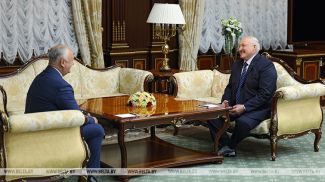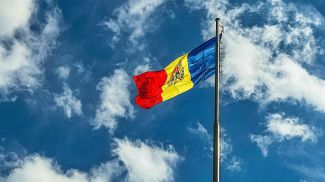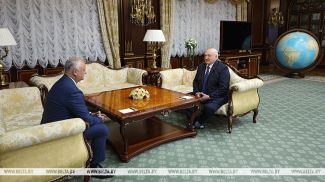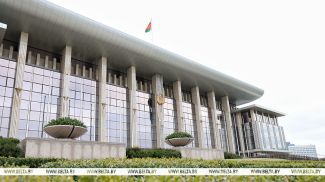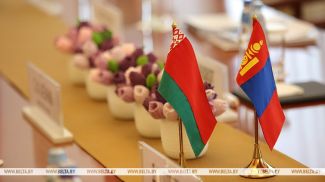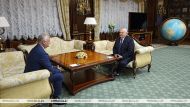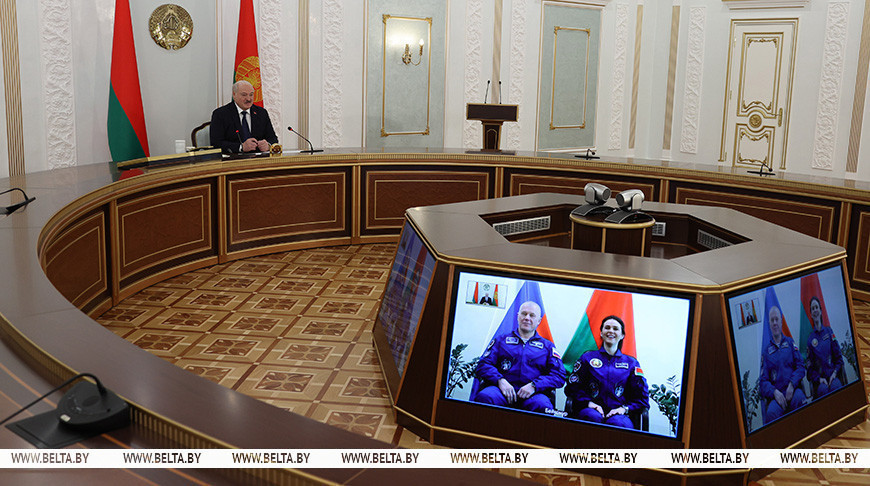
News of the story
"President's Week"
The work schedule of the Belarus president is always full of events. Aleksandr Lukashenko holds conferences and working meetings on the most topical matters concerning the country’s development, regularly visits the regions, goes on foreign trips and welcomes foreign guests, talks to reporters, signs decrees and laws. And even if there are no public events, it does not mean that the head of state does not work. It must be said that even when he relaxes, for instance, by playing ice hockey or chopping firewood, Aleksandr Lukashenko happens to find the time to give yet another instruction. All the decisions must be prompted by life, he likes to say.
The President’s Week project is intended for those, who want to keep up with the head of state, be up-to-date on the latest statements and decisions of the Belarusian leader.
Over the past week the head of state held a conference to discuss preparations for the next session of the Belarusian People’s Congress. He touched upon the latest presidential election in Russia during the meeting.
Close attention was paid to the launch of another mission to the International Space Station from the Baikonur Cosmodrome. It was important for Belarus because it was the first time the country had launched a cosmonaut of its own since Belarus had become independent. The Belarusian woman Marina Vasilevskaya became that cosmonaut.
The president also met with outgoing MPs, presented a number of government awards, and spoke in positive terms about the performance of members of the lower chamber and the upper chamber of the Belarusian parliament.
Common pain and the readiness to shoulder burdens of a brotherly nation – the tragedy in Moscow Oblast has brought Belarusians and Russians even closer to each other. Aleksandr Lukashenko discussed the counteraction of terrorism and extremism with President of Russia Vladimir Putin and offered sincere condolences to his counterpart.
The weekly schedule also had interesting sport events. In the evening on 18 March Aleksandr Lukashenko played as part of the presidential ice hockey team against the Dinamo Minsk club.
These and many other things are covered by the latest episode of BelTA’s special project President’s Week.
MARINA IN ORBIT. What did the president tell the first Belarusian woman in the outer space?
For the last few weeks Belarus has been looking forward to the flight of Marina Vasilevskaya to the International Space Station on 23 March. She is the first Belarusian cosmonaut since the country became independent. The launch had its share of difficulties: the first attempt to launch the rocket from the Baikonur Cosmodrome on 21 March was cancelled within seconds of ignition because of technical reasons but later on the manned crew transfer vehicle Soyuz MS-25 still managed to go to orbit, marking a new milestone in Belarusian cosmonautics. The Russian cosmonaut, who was born in Belarus, Oleg Novitsky as the crew commander also went to the ISS together with Marina Vasilevskaya and NASA’s Tracy Dyson.
To say that Aleksandr Lukashenko was worried sick and personally kept an eye on all the stages of the Belarusian woman’s training process for the space flight does not do it justice. This is why a phone call to Roscosmos Director General Yury Borisov the next day after the first launch was canceled came as no surprise.
Throughout the entirety of his presidency Aleksandr Lukashenko has been rooting for outer space exploration. He does everything to make sure this industry grows in Belarus, multiplies its potential that was accumulated back in the USSR times.
Tasks in orbit and a signature dish on Earth
Aleksandr Lukashenko has repeatedly talked to Marina Vasilevskaya and her backup Anastasia Lenkova. He is also friends with Oleg Novitsky.
This is why the president’s parting words were even more appreciated several days before the flight. On 19 March Aleksandr Lukashenko held a video conference call to talk to the cosmonauts, who were going through final preparations for launch at the Baikonur Cosmodrome.
“We will worry about you a lot and hope that I will see you here after your return! Oleg, we'll make our traditional salad [the head of state cooked a special salad during a previous personal meeting with Oleg Novitsky] and treat Marina to it! Especially since she has a hobby. It is the first time I’ve seen a girl that knows how to cook and likes cooking. We'll teach her how to make our salad!” the president said.
Aleksandr Lukashenko began the meeting with a question addressed to the crew commander: “Oleg, a question for you as a commander. How are you and our main heroine of the day feeling?”
Oleg Novitsky said that Marina Vasilevskaya was in an energetic mood, she was calm, eager to work, to fulfill the project as a whole.

The conversation focused on serious matters but proceeded in a very friendly and easy-going atmosphere. Everyone was in good mood. There were a lot of jokes. For instance, Aleksandr Lukashenko asked Oleg Novitsky to personally make sure that Americans would not kidnap her into their segment of the ISS.
Marina Vasilevskaya also shared her worries and feelings with the head of state: “Of course, I feel worried and a little excited since I am both a girl and all of it is the first time for me. But I have a very experienced, reliable commander, and he gives me a lot of confidence.”
“You have a good example, stay close to Oleg. He is an experienced man. It is not his first flight,” Aleksandr Lukashenko advised.
He stressed that Belarusians worry a lot about the cosmonauts as a whole and about Marina Vasilevskaya in particular: “You should know that you are our people. We will wait for you here in Belarus.”
“We know it, Mr. President, and that is why confidence in the successful completion of the entire project is constantly high. Thank you very much for the support of the entire crew as a whole,” Oleg Novitsky said.
At the end of the meeting the president added: “Thank you. See you later! Marina, don't worry, look at Oleg.”

“Yes, my commander is very supportive, really. This is why my spirit is strong. I am ready to fly, everything will be fine. With God's help,” Marina Vasilevskaya responded.
“Thank you. You will be close over there. Say hello if you can. I also asked Him to greet you well over there. This is why I wish you every success and best regards,” Aleksandr Lukashenko said at the end of the meeting.
Continuation of joint projects for outer space flights
During the meeting the head of state also asked the crew not to forget the other Belarusian woman – the backup cosmonaut Anastasia Lenkova: “We'll meet and talk about her prospects. She was trained the same way Marina was, so we can't lose the person either.”
“We will not lose her,” Oleg Novitsky assured.
Aleksandr Lukashenko mentioned his intention to contact the Russian side in order to organize a space flight for all the three Belarusian cosmonauts in the future: Oleg Novitsky, Marina Vasilevskaya, and Anastasia Lenkova. “I’d love for you three to fly together,” the president noted.
Aleksandr Lukashenko told Oleg Novitsky: “If you feel well [after this flight to the ISS], I'll ask Russians to allow three people to fly. Anastasia, Marina, and you.”

“Okay. I'd love it. We'll accomplish any mission,” the cosmonaut said in response.
“Okay, then I will talk to the president of Russia about it when I meet with him,” Aleksandr Lukashenko promised.
In turn, Oleg Novitsky also had a request for the Belarusian head of state: “Can you also ask him to allow Belarusians to train not as foreigners, but as brothers? They have to be able to participate in the training program as professionals.”
The president backed the initiative and expressed confidence the Russian side would agree to the proposal. Aleksandr Lukashenko assured he would discuss the proposal. He stressed that the overall cooperation with Russia in space exploration develops on a mutually beneficial basis. “We have a powerful company that makes satellites, including for Russia,” the president mentioned an example. “When sanctions were imposed, they thought we would collapse, but it turned out that we were needed. Especially by the space industry of the Russian Federation.”
The status of the Belarusian cosmonaut
The same day Aleksandr Lukashenko signed decree No.100 “On the status of the Belarusian cosmonaut” that establishes rights and obligations of a cosmonaut of the Republic of Belarus. The document determines the legal status of cosmonauts and persons equated to them taking into account the realization of the first space flight project in the sovereign history of Belarus.
The status of a cosmonaut shall be assigned to a citizen of the Republic of Belarus who has made a space flight and to their backup.
In order to recognize the cosmonaut’s services to the Motherland, the decree provides for a number of benefits and preferences, including job retention, medical care at the National Clinical Medical Center, pension provision, and state support for housing construction.
According to the document, a cosmonaut shall have to live up to their high status, have a firm civic position, take an active part in the social and political life of the country, and adequately represent Belarus in the international arena.
According to the president’s press service, the decree’s implementation will contribute to the positive image of Belarus as a high-tech state, to the propaganda of the country’s knowledge and competencies in the field of peaceful space exploration.
OVERWHELMING RESULT. What did Belarus learn from the latest presidential election in Russia?
On Monday, 18 March Aleksandr Lukashenko talked to President of Russia Vladimir Putin after the latter won a presidential election by winning over 87% of the votes.
The president congratulated the Russian counterpart on behalf of himself and the entire Belarusian nation. Right after the call Aleksandr Lukashenko raised the matter of the Russian presidential election and shared details of the phone call during a government conference held to discuss preparations for the session of the 7th Belarusian People’s Congress.
“I have just spoken with the Russian president and congratulated him on winning the presidential election First of all, he asked to convey his gratitude to those present here and to other people who helped to organize the presidential election in Belarus (we had six polling stations),” Aleksandr Lukashenko said. “The election was held in the most orderly manner like nowhere else. Despite the West’s attempts to destabilize the situation here, the results are very good. The Russian embassy worked very well in contact with our authorities. Therefore, I convey to you the Russian president’s gratitude for the work and organization of the presidential election in Belarus.”
“Certainly, the result is overwhelming. The results are very serious, and the turnout was very high. The turnout has never been that high in the Russian Federation. Therefore, with such a high turnout, the results were unexpected to some extent. This is my position, and I told him that,” the head of state stressed.
The key lesson
Aleksandr Lukashenko added that it is necessary to learn from any events. In his words, this time the most important lesson is that foreign forces cannot impose their will on the peoples of Belarus and Russia. “If you try to do that, people will do the opposite no matter how complicated it will be. Therefore, the well-known forces failed to impose their will on the Russians. The people did great. They rallied during this election period and showed who runs the house. Secondly, it was a serious signal to the West, which had been intent on destabilizing Russia from within. Since things are not working out for them at the front, they tried to mess things up from within. It didn’t work out either. And thirdly, we must understand that this is a lesson for us as well. In the run-up to the presidential election in Belarus in 2025, it is important to carefully study the Russian experience,” the president said.

The head of state stated that the Russian Presidential Administration had planned and organized the electoral process brilliantly. “Naturally, the president had to work hard. You saw it. Unbelievably hard. He did a great job. He traveled all over Russia, visited different places and answered burning questions of Russian society. The planning that went into the pre-election process and the election campaign itself was very good. There’s a lot to learn. Everyone was mobilized and united, as the Presidential Administration had intended. Everyone worked patriotically and produced an excellent result. It is a lesson for us,” the Belarusian leader pointed out.
Joint plans and great work
“We have agreed with the Russian president (it is very important) that Belarus will be able to take part in all the programs that he mentioned in his address to the Russians. The plans are very interesting, they are feasible. They are estimated to cost about RUB9 trillion. The Russian president said that he would be pleased to welcome the contribution of Belarusians to the realization of these plans,” Aleksandr Lukashenko said.
He recalled that Belarus and Russia are now implementing various joint projects. For example, there are plans to build a high-speed railway. “From Moscow through Minsk and, as I’ve asked Vladimir Putin, to Brest. We have many other plans that we will implement. Therefore, full support. There is a lot of work to do. But we will need to live through our own [presidential] election in 2025,” the president said.
SOLEMN AND MEANINGFUL. What will the 7th Belarusian People’s Congress be like?
The government conference Aleksandr Lukashenko hosted to discuss preparations for the first session of the Belarusian People’s Congress, which is due in April, included top officials of the Belarus President Administration, heads of the upper chamber of the Belarusian parliament, of the Belarus President Property Management Directorate, and of the Secretariat of the Belarusian People’s Congress.
The head of state stressed the significance and the status of the upcoming event: “Yes, this is the seventh convocation, but it is special, it is constitutional. Therefore, it is very important to hold it at the highest level both in terms of format and content.”
The nomination of candidates for the Belarusian People’s Congress has already begun. An organizing committee under the chairmanship of the prime minister had been formed earlier. Detailed plans for the first session of the Belarusian People’s Congress are being developed. Aleksandr Lukashenko suggested discussing the questions that had piled up and making the necessary decisions.
The president drew attention to the need for thorough preparations for the session of the Belarusian People’s Congress and cited the presidential election in Russia as an example. “This event should be solemn and, most importantly, substantive. Just like the election in Russia that was impeccable. So that no one will be able to criticize us later on. We are now in the focus of political attention. No turbulence is expected in or around Russia. But we are having the Belarusian People’s Congress. Our self-exiled opposition and the West will go out of their way to disorganize and hamper the session and the decision-making process. We should not give them such a gift,” Aleksandr Lukashenko said.

According to Prime Minister, Chairman of the Organizing Committee of the Belarusian People’s Congress Roman Golovchenko, everyone is interested in holding this significant event smoothly. The first session of the 7th Belarusian People’s Congress is expected to take place on 24-25 April.
HIGH PRAISE. What are outgoing MPs noted for and what does Aleksandr Lukashenko expect from the new ones?
On 21 March following the established tradition the president met with outgoing members of the National Assembly. In the Oval Hall of the House of Government Aleksandr Lukashenko summed up results achieved by members of the lower chamber and the upper chamber of the Belarusian parliament, presented government awards to outstanding parliamentarians.
According to Aleksandr Lukashenko, time runs fast. “We have not noticed how the new term of our parliament has ended. Life passes in stages in the same way. The most important thing is what we will leave behind. The current parliament, the authorities have something to say and have something to leave in this period for our people, our children, those who will come after us,” the president said. The outgoing parliamentarians have done a great job. In addition to professionalism they demonstrated reliability and loyalty to the Belarusian nation.”
Trials of the last few years
Aleksandr Lukashenko emphasized that members of the House of Representatives and the Council of the Republic of the seventh convocation had succeeded as politicians and had proved with deeds that they are worthy of the high title of people’s representatives: “You had to work in a special period of Belarus’ modern history when time tested our strength as never before.”
The head of state recalled a number of challenges the country has faced in recent years. These included the pandemic, which changed the usual conditions of life and economy in the blink of an eye; political events of 2020, when homegrown extremists with the help of Western foreign sponsors encroached on the foundations of the Belarusian statehood.
“In those complicated days the majority of parliamentarians experienced monstrous psychological pressure from radicals of various kinds,” Aleksandr Lukashenko said. “Attempts were made to intimidate MPs, senators, their relatives and friends. They were even threatened with physical violence. The coup instigators were clearly intent on sowing confusion and split in government bodies. But as you know, their plans have failed completely.”
Solidarity in interaction between the branches of power
The president noted that a solidarity style of interaction between all branches of power and government bodies had always been a distinctive feature of the Belarusian model of statehood: “The absence of disagreements and petty political struggle, the commitment to constructive cooperation helped us defend national interests and achieve the necessary results.”
“That’s the way you worked. Both houses acted in concert, in close contact with the government and other state bodies and always organized their work taking into account interests of the Belarusian people,” Aleksandr Lukashenko said.

He stated that people had seen it and had made conclusions out of the events in Belarus and around the globe. “The Belarusian people made their sober assessments of the situation and once again confirmed their wisdom and desire to be the master of their native land,” the head of state stressed.
A geopolitical rift
A geopolitical rift is one of the problems of recent years. “A large-scale, systemic crisis, which symptoms are obvious for all of us not only in the military-political area but also in the economic area and the humanitarian area,” the president said. “Norms and principles of international law have been replaced by instruments of political and economic pressure. Diplomacy is getting increasingly often replaced by the policy of sanctions. Moreover, these sanctions are meant to destroy.”
Aleksandr Lukashenko stressed that Belarusians live comparatively normal and full lives in comparison with what is going on in many neighboring countries.
“We have significantly reinforced our Armed Forces. Economy demonstrates growth. People work and receive wages. There is peace and order in streets of Belarusian cities. The state honors its social obligations. The most important thing is that our citizens feel safe and do not fear for the lives of their loved ones and friends. It doesn’t come cheap. Parliamentarians have also made a worthy contribution to the common cause,” Aleksandr Lukashenko said.
Lawmaking efforts
In the course of its work the seventh-convocation National Assembly passed a total of 364 laws, 11 of which had been initiated by members of the House of Representatives and one by the Council of the Republic.
“Certainly, the number of legislative acts you have adopted is not the point. The creation of optimal legal conditions for peaceful and dynamic development of all areas of life of the state and our society is. Given the realities in which the National Assembly of the seventh convocation had to operate, the key goal of lawmaking was to secure the quality of sovereignty the Belarusian state has achieved,” Aleksandr Lukashenko emphasized.
Amendments and additions to the Basic Law of the country marked a new stage of state-legal construction. People literally wrote the Constitution for the sake of the people. “This is the most important thing. We see that people believe in Belarus, connect their future, the future of their children and grandchildren with it. I am talking not only about our citizens right now. I also mean the foreigners who have chosen Belarus as their second homeland. Their numbers keep increasing,” the president said.
The adoption of the constitutional amendments alone required updating about 90 laws. This demanding, painstaking work lasted almost two years. The law on the Belarusian People’s Congress deserves a mention. Essentially the country will begin a new chapter in its historical development once this constitutional body is formed.
Aleksandr Lukashenko mentioned the adoption of the new law on the foundations of civil society, laws and regulations geared towards enhancing the economy, including in conditions of the sanctions-fueled pressure.

“These and other legislative acts will significantly strengthen the national economy,” Aleksandr Lukashenko said. “A strong social policy has always been a signature feature of the Belarusian state. In recent years we have made a number of relevant decisions in education, healthcare, social welfare, culture, and youth policy.”
“In the context of the hybrid war unleashed against our country, most of the adopted laws are, in one way or another, related to ensuring national security. In response to the escalation of the military threat around Belarus, you have amended the legislation to ramp up the defense potential of Belarus,” the head of state recalled.
“The great work done by the parliamentarians to defend the historical truth should be viewed as part of the efforts to strengthen national security. You work in parliament coincided with the period of modern history when the call became particularly strong for the formation of self-identity, the preservation of traditional values and the truth about the historical past of our Belarus,” the head of state noted. “The law on the genocide of the Belarusian people represents a major innovation in Belarusian legislation.”
Social work of parliamentarians
“The approach when the state takes care of resolving all the problems people face in addition to enabling conditions that allow people to solve the problems on their own has become a guideline for the parliament’s interaction with the population. I think it is the most correct approach. Assistance to socially vulnerable categories will remain one of the priorities of our policy and Belarus will invariably remain a welfare state,” Aleksandr Lukashenko emphasized.
The president praised the huge work conducted by the MPs to provide targeted support to the most vulnerable categories of citizens. Belarusian parliamentarians took an active part in addressing the issues people had been worried about. They held thousands of person-to-person meetings, call-in events, and meetings with worker collectives. Many of the complaints submitted by citizens prompted discussions during the development of bills and other statutory and regulatory enactments.
Aleksandr Lukashenko also praised public discussions of draft laws as a positive practice in interaction with people: “This has made it possible to establish feedback with the population, take into account reasonable suggestions of citizens when preparing decisions.”
The president also mentioned the interaction of parliamentarians with young Belarusians and the creation of the Youth Council under the National Assembly.

The priority tasks the seventh-convocation parliament had to accomplish included the development of an effective regional policy and the enhancement of the role local self-government bodies, self-administration bodies play in ensuring the social and economic development of regions. The president encouraged parliamentarians to promptly and decisively respond to the high-profile problems raised by people on the ground: “It is necessary to act proactively in response to the nation’s increased demand for open communication with the government and for greater inclusion of citizens in the decision-making process. It is necessary to be aware of the state of affairs in the regions, find bottlenecks in a timely manner, and work out concrete mechanisms for resolving existing problems.”
International affairs
The head of state pointed out that the outgoing parliamentarians had noticeably expanded international contacts. They have strengthened positions in cooperation with parliamentarians of Russia and other EAEU countries, established contacts with their colleagues from Latin America, the Far East, and Africa. "You have made many new friends," Aleksandr Lukashenko said.
The parliamentarians worked to promote a peaceful, unifying agenda and strengthen the image of Belarus as a reliable and, most importantly, predictable state. “Despite all the efforts the collective West has failed to isolate Belarus in the international arena. Moreover, the country’s international positions have even strengthened,” the head of state emphasized. It is confirmed by the election of Belarusian parliamentarians to governing bodies of the Inter-Parliamentary Union.
Aleksandr Lukashenko mentioned an active dialogue between the legislative bodies of Belarus and Russia. Partnership with the CIS Inter-Parliamentary Assembly and the CSTO Parliamentary Assembly has been traditionally constructive. The level of cooperation with the Chinese parliament has increased. For the first time the parliament has set up a delegation for work in a new international structure - the Non-Aligned Movement Parliamentary Network established in 2021.
“Efforts were stepped up to develop contacts with parliamentary organizations of the countries pursuing an independent foreign policy and respecting the right of other nations to an independent path of development. Proposals to create parliamentary dimensions of the SCO and BRICS are timely and, I think, promising,” the head of state emphasized.

At the same time Belarusian MPs continue to actively defend national interests in the OSCE Parliamentary Assembly, using any formal and informal occasions to bring the truth about Belarus to citizens of Western countries.
“The new parliament will have to preserve and multiply your achievements in the development of international relations,” the head of state pointed out.
Continuity
Speaking about the new composition of the parliament, the head of state noted that decent representatives of the Belarusian people had been elected, who are capable of significantly enhancing the role of the parliament in consolidating all the patriotic forces of the Belarusian society.
The new parliamentarians include a lot of representatives of the four political parties and people, who have already worked in the parliament.
“It is very important for the elected parliamentarians to be active. Their voice has to become authoritative. They should represent Belarus with dignity behind the parliamentary rostrum, in mass media, outside the country and give a tough response to our opponents and adversaries,” the Belarusian leader said.
Aleksandr Lukashenko stressed that the newly elected MPs will work during the country’s most important social and political campaign - the presidential election in 2025. “It is already obvious that we will continue to be tested in this difficult time. It is important to realize that the people’s elected representatives have a special responsibility to consolidate society and maintain civil peace and accord,” the president said.
In conclusion he once again thanked members of both chambers of the National Assembly for their fruitful work for the benefit of Belarus. “Your main accomplishment also as representatives of your constituents is that you have helped preserve stability and peace in Belarus. Today we have realized that this is the most important immutable value of any nation,” the Belarusian leader said.
SHARED PAIN. How did Belarusians respond to a terrorist attack in Moscow Oblast?
On 22 March Belarusians commemorated another anniversary of the Khatyn massacre. Representatives of government agencies, the general public, and patriotic forces went to the memorial complex Khatyn to lay flowers and wreaths, light candles in memory of residents of this village and of hundreds of other Belarusian villages that the Nazi shot, tortured to death, and burned alive during the war.
In the evening on the same day indifferent Belarusians once again brought flowers and candles but to the Russian embassy in Minsk. A majority of Belarusians treated news about a monstrous terrorist attack in the concert hall Crocus City Hall in Moscow Oblast as a personal tragedy. The scale of what transpired is shocking: more than 100 people have been killed and wounded by the terrorists, who used assault rifles to fire at civilians. Belarusian medics offered their aid to Russia right away.






On behalf of the Belarusian nation and himself Aleksandr Lukashenko offered condolences to Vladimir Putin after the attack: “We resolutely condemn this brutal murder of innocent people, for which there can be no justification. I am convinced that all those who took part in the planning and perpetration of this act of violence will be identified and punished.”
The head of state wished bravery and courage to friends and relatives of the dead so that they could survive the irreparable loss. He also wished a speedy recovery to all the injured.
Aleksandr Lukashenko talked to Vladimir Putin over the phone the next day after the terrorist attack. Once again the Belarusian head of state personally expressed deep condolence to the Russian counterpart. The presidents reaffirmed their readiness to continue Belarus-Russia active interaction and maintain contacts between the relevant agencies for the sake of effectively responding to terrorist and extremist threats.




